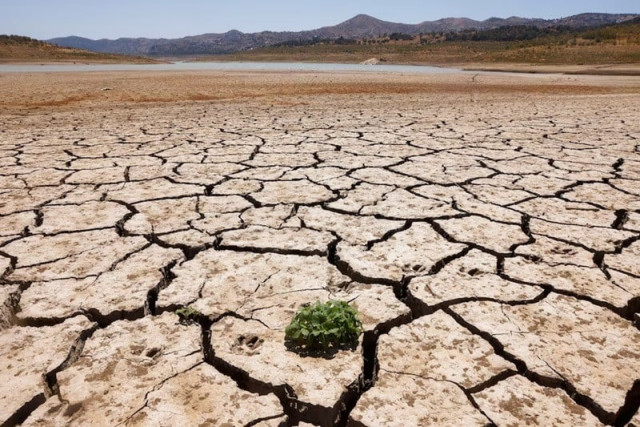Drought conditions jeopardise agriculture
Decreased levels of rainfall have disturbed the production of several staple crops, particularly wheat

"Where there is water, there is life." The deepest implications of this adage could best be understood by the hapless farmers in Khyber-Pakhtunkhwa, who in the absence of other sources of income, rely predominantly on rainfall to determine the earnings of their cultivation season.
Like other parts of the country, Khyber-Pakhtunkhwa (K-P) has faced an alarming lack of rainfall during the past few months. According to the Meteorological Department, Pakistan received less than 40 per cent of its expected rainfall between September 1, 2024, and January 15, 2025, raising concerns about widespread drought. Experts warned that if this dry spell continued, it could severely affect crops and agricultural yield.
The Meteorological Department has issued advisories to relevant authorities, highlighting the dire situation. The plains of Pakistan have been particularly affected, with Sindh receiving 52 per cent less rainfall, Balochistan 45 per cent less, Punjab 42 per cent less, and K-P recording 40 per cent less downpours. This deficit poses significant risks to agriculture, especially in K-P, where the economy heavily relies on farming.
For instance, Naveed Jan, hailing from Nowshera, who has been involved in agriculture since the past 30 years expressed his concerns regarding the future of his profession. "This year, there has been almost no rain. The impact of the drought conditions on wheat and other crops has been devastating. We might yield a poor wheat harvest this time, which would only aggravate the struggles of farmers already burdened by the rising costs of fertilizers and pesticides," lamented Jan, who further criticized the provincial government's plans to impose additional taxes on agricultural land.
According to Dr Farida Anjum Noreen, Director of the Agriculture Research Institute Tarnab, January, February, and March are critical months for crops, particularly wheat. "We are now hoping and praying for rain during these months. Rain is essential for agricultural lands, especially in areas without canal systems. Therefore, the lack of rainfall could further lower the water table, leading to severe water shortages in the future. In this scenario, farmers should be guided to cultivate crops that require less water," suggested Dr Noreen.
Meanwhile, a report by the Anti-Corruption Cell has revealed large-scale corruption in wheat procurement by the K-P government. Investigations have uncovered irregularities in the purchase of wheat from districts such as Haripur, Nowshera, and Mansehra, where favouritism played a role in supplier selection.
According to sources, the K-P Food Department purchased 230,000 metric tonnes of wheat from farmers in Punjab and K-P in June 2024 at a rate of Rs3,900 per tonne. Advocate Qazi Anwar, a member of the Pakistan Tehreek-e-Insaf's Accountability Committee, stated that complaints of alleged corruption in the procurement process had been received. "The committee has prepared a questionnaire, and provincial food ministers, secretaries, and other officials will be summoned for explanations," he said.
K-P's Food Minister Zahir Shah Toru clarified that the wheat in question was purchased from PASCO, a federal government body that sourced the wheat from Ukraine. "The wheat has been sent to laboratories for testing, and if found substandard, action will be taken against the responsible officials," he assured. Toru emphasized that the provincial government was committed to transparency and ensuring public funds are not wasted. "We are fully aware of the impact of the lack of rainfall and are on high alert to address the situation," he said while simultaneously expressing his hope that rainfall might begin in February.



















COMMENTS
Comments are moderated and generally will be posted if they are on-topic and not abusive.
For more information, please see our Comments FAQ